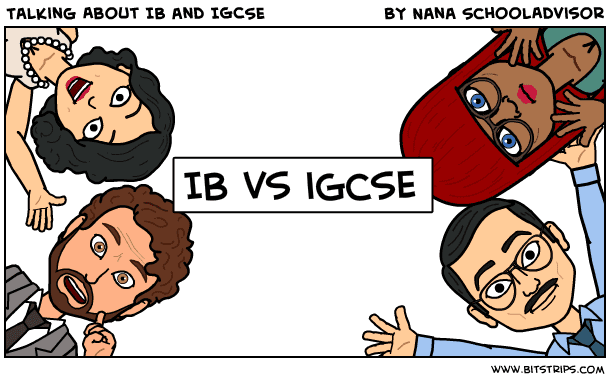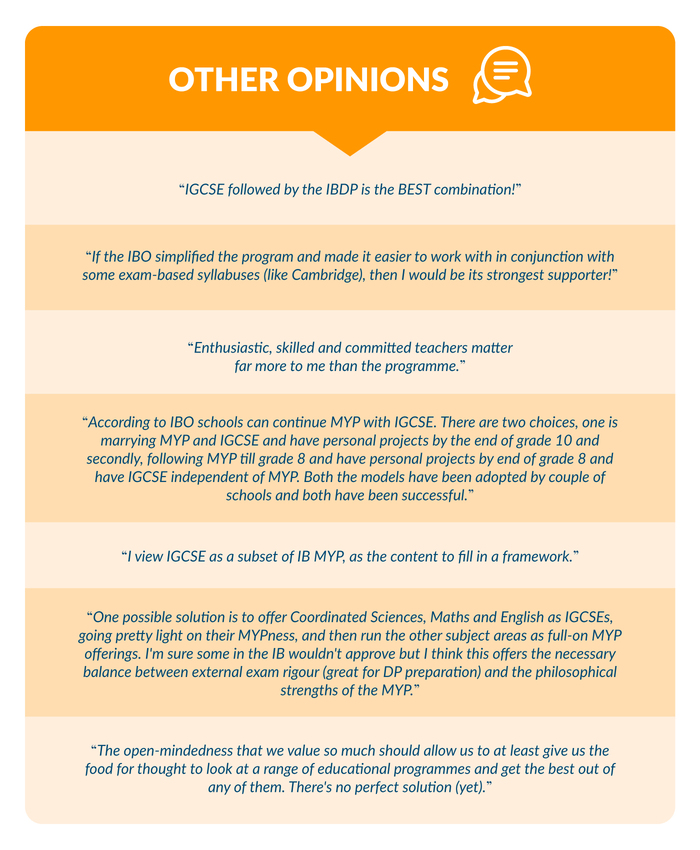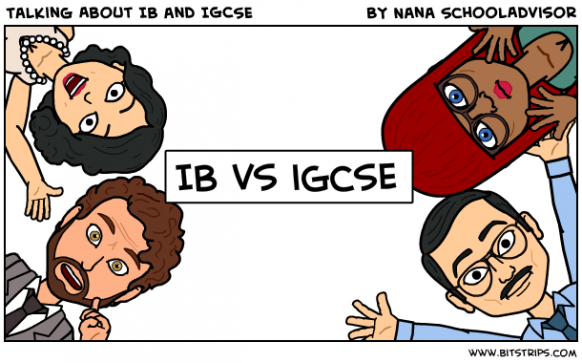A Side by Side Comparison between IB and IGCSE
 Schooladvisor Team
Schooladvisor TeamLets look into the difference between these two internationally recognised programmes, perhaps the most popular options in Malaysian International schools: the IB (International Baccalaureate) and IGCSE (International General Certificate of Secondary Education).

Much debate has been carried out between the two systems. IB is famous for positioning itself as an education framework as opposed to IGCSE which is a school curriculum system.
We have compiled the thoughts of educators, policy makers, parents and students in a side-by-side comparison so Malaysian parents may have a better understanding of the two and will be able to make the best informed choice regarding this aspect.
Do take note that these are the personal opinions of individuals and may not reflect the position of the School Advisor's team.
What's the difference?
| IB | IGCSE |
|---|---|
| International Baccalaureate offers four educational programmes for children aged 3-19. | Cambridge International Examinations (CIE) are a provider of international qualifications, offering examinations and qualifications in more than 160 countries. |
| Founded in 1968, the International Baccalaureate (IB) is a non-profit educational foundation | IGCSE is the international variant of the British GCSE qualification for an international student body at a secondary level. |
| There are no formal examinations set or marked by the IB. Instead the IB validates the grades of final-year students in schools that request this service, and issues certificates to those students who reach a required standard. | It is a qualification based on individual subjects of study, which means that one receives an "IGCSE" qualification for each subject one takes. |
| Check: IB Official Website | Check: IGCSE Official Website |
Programmes
| Programmes
|
What parents, students and teachers say
| IB | IGCSE |
|---|---|
| IB is an education framework and not a curriculum. | The IGCSE means you're teaching to a pre-defined, country-specific, very straight-forward exam with a definite content based goal. |
| IB programmes are a continuum and they aim to guide students towards graduating from the Diploma programme with a certain mastery skill in certain subject areas. | IGCSE prepares students for an examination and follows a relatively prescriptive course. |
| Schools that are authorised to run the PYP and MYP make a commitment to pay for the fees which include training for the teachers. | Whilst there is some relevance to GCSE, it is designed to serve students anywhere in the world. |
| The four programmes (PYP, MYP, Diploma, Career-related) were designed by different people at different times for different reasons. | IGCSE/GCSE is a functioning curriculum (based on the English national curriculum. |
| MYP is a pedagogical framework designed to adapt to any curriculum that any particular school must deliver. | IGCSE is an exam, normally completed at age 16, prepared for over the preceding two years. |
| IB requires the leadership of an administrator who understands it. It is not a prescriptive curriculum. | Describing IGCSE as "exam-driven" is a bit unfair. |
Praises
| IB | IGCSE |
|---|---|
| It allows for more teacher control over meeting the needs of the students, the local culture and school's expectations. | IGCSE provides a straightforward path for making choices on where to go for a tertiary education. |
| It is more student-centered. | The accountability is external. Externally graded certificates have greater trust associated with them than internally, school-assessed qualifications. |
| Teachers are required to work together across their departments to deliver the most meaningful lessons to students. | Teachers spend less time on meetings, creating resources and writing curriculum. |
| Many IB students consider themselves alumni of not just their school, but of the IB. | It encourages more participation from schools, teachers and publisher engagement. |
| It is flexible because they provide schools with a framework to work side-by-side with another curriculum. | A structured examination at the end of the course that allows for international comparison of ability, is acceptable for university applications and creates a goal for students to work towards. |
| Teachers who are accustomed to designing their own curriculum, find the IB liberating. | The curriculum is designed to serve students anywhere in the world. |
| Parents are exceptionally satisfied with it as they can see the result in their children's behaviour. | The IGCSE market position is naturally dominant among Southeast Asian countries. |
| It should be possible to teach almost any curriculum under the IB banner. | The IGCSE is cheaper and easier to implement. |
| The goal is far more skills based than content-based. | Syllabus-driven, examination-centred IGCSE is more popular among Asian parents and teachers primarily for the structure it provides. |
| IB enables schools to function both regionally and internationally within their school districts. | IGCSE offers the best foundation for Diploma programmes. |
| IB candidates who do not get 7's perform as well as top students from other national curriculum. | IGCSE offers a smooth, almost seamless, entry into the IBDP courses. |
| For sponsorships, bigger companies prefer the IB and its programmes, as it attracts the global talent they seek. | IGCSE is not very rigorous; students can get by without too much work. |
| Students whose parents are continually moving around the world because of their profession (i.e. the expatriate nomad) will find that IB is clearly the best solution. | CIE is fantastic at marketing and getting to the roots of the basics and reach of the school. |
Complaints
| IB | IGCSE |
|---|---|
| The implementation of IB is almost entirely dependent on what your school and teachers put into it. | IGCSE focuses on external examinations at the end of the course. |
| IB requires more work for teachers in that every year the students' abilities must be taken into consideration and the curriculum should be re-evaluated and updated. | The IGCSE curriculum rarely requires teachers to work with anyone outside of their department to make the material more rich and meaningful for students. |
| The programme is demanding on students and teachers and complicated to implement. | The curriculum is prescriptive: you learn and you regurgitate - maybe at times you are required to think and make judgments but generally you are required to provide the "right" answer. |
| It ends up being an elitist program - only suitable for schools serving the wealthy elite. In a way IB schools have become symbolic for the wealthy elitist and rich families. | The exam-driven systems are killing off the ability of schools to actually educate. |
| IBO is pricing itself out of some schools with its increasingly expensive workshop fees. | Schools that are used to the IGCSE only, would play safe and keep the same old wheels turning. |
| Many universities around the world still do not acknowledge the IB Diploma as an equivalent to a local diploma. | The syllabus is not really international and very UK focused. |
| Many IBDP graduates are considered as freshmen and not sophomores in highly recognisable universities. | There is no assessment based coursework in IGCSE |
| IB is fairly new and does not have the continuity to compete with IGCSE. | Content-based learning, such as memorising formualae, dates, events, etc. is becoming stuff of the past. It can be Googled or taught effectively using accelerated learning techniques. |
| There is a disconnect between the MYP and DP programmes. | The implementation lacks the rigour required to prepare students for the DP. |
| The knowledge received by students from Year 0 to Year 5 is not satisfactory when they get to the Diploma stage. | Students are forced to focus completely on textbook-oriented, exam-focused learning. |
| Attempts by the IB to stitch the PYP, MYP and DP into a seamless whole are, at best, a work in progress. | Exam-based learning like IGCSE wastes a great opportunity to develop powerful connected thinking and creativity in students. |
| IB's lack of paper based assessments is unlikely to earn the trust of parents and students as easily as the Cambridge exam-based prescriptions. | The syllabus demands that the same curriculum be delivered year after year, no matter the students' individual, cultural or collective needs. |

See also:
How International Baccalaureate (IB) Differs From Other Curriculums

